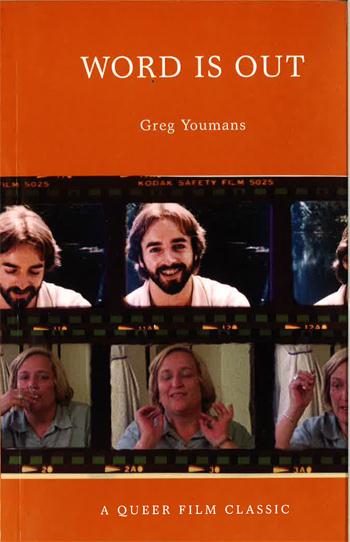The groundbreaking 1977 film Word Is Out was one of the first documentaries to focus on the lives of gay and lesbian people. Directed by a collective known as the Mariposa Film Group (Peter Adair, Nancy Adair, Andrew Brown, Rob Epstein, Lucy Massive Phenix and Veronica Selver), the film profiled 26 lesbians and gay men of various ages, races and backgrounds. Broadcast nationally on US television in the midst of the rampant homophobia of Anita Bryant’s Save Our Children campaign, the film is a pioneering example of gay and lesbian people fighting back by getting their own stories out there.
Thirty-five years later, the film – and the historical context in which it is set – is explored in a volume of the Queer Film Classics series, which canonizes the most important and influential films about and by lesbian, gay, bisexual and trans people. The Word Is Out edition is one of nine books released so far in the series, which is edited by two of Canada’s leading queer film critics: Thomas Waugh and Xtra contributor Matthew Hays.
For Word Is Out, Waugh and Hays brought on Greg Youmans, a scholar of queer activism and experimental filmmaking. Youmans sets out to trace the course of the historical development of the film. He cleverly divides the book into chapters represented by letters of the alphabet, except for J, which Youmans admits he simply couldn’t find an appropriate word for. From “A is for Anita” (which takes on Bryant’s noted campaign) to “Z is for Zoom” (about the film’s intricate use of a zoom lens), this format allows Youmans to avoid reducing his argument to a singular narrative.
This is key in an analysis of Word Is Out, a film that has just as many reasons to be critiqued as it does to be celebrated. On the one hand, it is indeed a remarkable example of a collective effort to express a diverse set of gay and lesbian voices to a mainstream audience. On the other, it is, as Youmans words it, “carefully non-controversial” and rather apolitical in nature.
Youmans was born the same year Word Is Out was released and admits it was initially difficult for someone who did not experience the 1970s as an adult not to see the film as rather conservative for something heralded as so groundbreaking. But through a wide variety of discussions, he eloquently makes clear why it’s more complicated than that. The result is an impressively expansive take on all things Word Is Out.

 Why you can trust Xtra
Why you can trust Xtra


